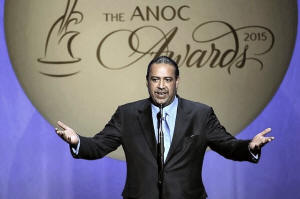|
Step
back for Sheikh Ahmad, Asia's sporting power broker
 Send a link to a friend
Send a link to a friend
 [May 01, 2017]
By Michael Church [May 01, 2017]
By Michael Church
HONG KONG (Reuters) - After almost a
decade as one of the game's main power brokers, Sheikh Ahmad
Al-Fahad Al-Ahmed Al-Sabah stepped away from his involvement in
world football on Sunday as the U.S Department of Justice probe into
FIFA's affairs claimed another victim.
His decision came after U.S. Court documents made reference to a
Kuwaiti Olympic official as being involved in the bribery case of
FIFA's audit and compliance committee member, Richard Lai.
Sheikh Ahmad has "strongly" denied any wrongdoing and said he
resigned the positions he held in football to avoid "distractions"
for the Asian Football Confederation (AFC) as well as global
governing body FIFA.
Whether it will end for good the fabulously wealthy Kuwaiti's
involvement in football's power games is open to question.
A high-ranking member of Kuwait's royal family and former Secretary
General of the Organisation of Petroleum Exporting Countries (OPEC),
Sheikh Ahmad has been involved in power games of one sort or other
for most of his adult life.
In recent years, they have been played out in the sporting realm,
where his acquisition of jobs alone is evidence of his huge
influence.

His titles include President of the Olympic Council of Asia (OCA),
member of the International Olympic Committee, President of the
Association of the National Olympic Committees (ANOC), President of
the Asian Handball Federation and Honorary President of Kuwait
Football Association (KFA).
In football, Sheikh Ahmad sat on FIFA's Reform Committee and the
Executive Committee of the Asian confederation.
He was appointed President of the OCA at the age of 27 in 1991,
succeeding his father Sheikh Fahad who had been killed in the Iraq
invasion of Kuwait the previous year.
Sheikh Fahad, then president of the KFA, sparked one of the biggest
controversies in World Cup history when he came down from the stands
to summon his players from the pitch until the referee agreed to
disallow a France goal at the 1982 finals.
The son shared his father's passion for football, even if his
involvement in the game outside Kuwait was initially on an informal
basis.
As head of ANOC, he was a key supporter of Thomas Bach when the
German replaced Jacques Rogge as president of the IOC in 2013 and it
was in an attempt at kingmaking that he first stepped into the
spotlight in football.
PUBLIC BACKING
After years orchestrating campaigns behind the scenes through his
Olympic connections, he publicly backed Sheikh Salman bin Ebrahim Al
Khalifa's failed 2009 attempt to oust then-AFC president Mohammed
bin Hammam from his seat on the FIFA Executive Committee.

The move was the first of a series of proxy battles between Sheikh
Ahmad and Qatari Bin Hammam, with the enmity between the pair
fuelling an escalation in the battle for control of the Asian game.
[to top of second column] |

ANOC president Sheikh Ahmad Al-Fahad Al-Ahmed Al-Sabah of Kuwait
speaks during the 2015 ANOC Awards at DAR Constitution Hall.
Mandatory Credit: Geoff Burke-USA TODAY Sports

The Kuwaiti's camp had greater success two years
later when the Sheikh Ahmad-backed Prince Ali bin Hussain defeated
Bin Hammam ally Chung Mong-joon to become Asia's FIFA Vice
President's position in 2011.
He then backed incumbent Sepp Blatter against Bin Hammam in the FIFA
presidential election later the same year, a poll from which the AFC
President was ultimately barred.
Sheikh Ahmad was a key supporter of Bahraini Sheikh Salman when he
was elected president of the AFC in 2013 following Bin Hammam's
lifetime ban from the game for corruption.
Two years later, he won a place on the FIFA Executive Committee and
backed Blatter as the Swiss saw off the challenge of Sheikh Ahmad's
former protege Prince Ali.
In the lead-up to last year's FIFA presidential election, he was
courted by both Sheikh Salman and Gianni Infantino before the Swiss
emerged victorious.
Sheikh Ahmad's influence seemed to be at its peak but, while he was
making waves on the global stage, there was controversy at home.
He endured a very public family feud that saw him handed a suspended
six-month prison sentence for quoting remarks by the country's ruler
without permission in 2015. The conviction was later quashed.
Kuwait was also banned by FIFA and the IOC over government
interference in sport stemming from Sheikh Ahmad's domestic issues.

The immediate impact of his decision to withdraw from all of his
football positions means next week he will not stand for re-election
for the FIFA Council, which replaced the Executive Committee, when
the AFC meets for its congress in Bahrain.
As he retains his place at the top table in the Olympic movement,
however, the likelihood that he exercises no future influence on the
world of football looks slim.
(Editing by Nick Mulvenney and Amlan Chakraborty) [© 2017 Thomson Reuters. All
rights reserved.]
Copyright 2017 Reuters. All rights
reserved. This material may not be published, broadcast, rewritten
or redistributed. |